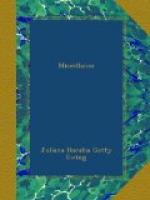“Very often, Fred. And when a big straggling city is built of wood in a hot climate which keeps the wood so dry that a spark will set it ablaze, when the water-supply is small, and the water-carriers, who feed the fire-engines from their leathern water-pots, are chiefly bent upon securing their pay for the help they give; and when, to crown all, the sufferers themselves are generally of the belief that what is to happen will happen, and that there is very little use in trying to avert calamity—you may believe that a fire, once started, spreads not by houses, but by streets, leaving acres of black ruins dotted with the still standing chimneys. However, I fancy that of late years wider streets and stone buildings are becoming commoner. There were stone houses, built by Europeans, in Constantinople even when I was there.”
“Did you see a fire whilst you were there?”
“Yes, indeed. One came so near the house where I lived that I had everything packed up ready for a start, but fortunately my house escaped. I must tell you that the Turks have one very sensible custom in connection with these fires. They have what are called fire-towers, on which men are stationed to give warning when a fire breaks out in any part of the town. They have a system of signals, by which they show in what quarter of the city the fire is. At night the signalling is done by lamps. There is an old Genoese tower between Pera and Galata which has been made into a fire-tower. The one at Stamboul I think is modern. These buildings are tall—like light-houses—so that the signals can be seen from all parts of Constantinople, and so that the men stationed on them have the whole city in view. Besides these signals, it is part of the watchman’s duty, as I told you, to give warning of a fire, and the quarter in which it has broken out. I assure you one listens with some anxiety when the ring of his iron-tipped staff on the rough pavement is followed by the cry, ‘Yan ghun vah! Stamboul-dah’ (’There is a fire! In Stamboul’); or ‘Yan ghun vah! Pera-dah’ (’There is a fire! In Pera’).”
“But there are fire-engines?”
“There may be very good ones now. In my time nothing could be more futile than the trumpery one which was carried on men’s shoulders. Indeed, until the streets are much less rough, narrow, and steep, I do not see how one could be driven at any speed.”
“Did the men who carried the engine run?”
“Yes, and at a good swinging pace too, their half-naked bodies streaming with perspiration, and (I should have thought) their labours quite doubled by yelling as they ran. Their cries are echoed by the formidable-looking band which follows, waving long poles armed with hooks, &c., for pulling down houses to stop the progress of the flames. On the heels of these figures follow mounted officials, whose dignity is in a fixed proportion to the extent of the calamity. If the fire is a very very extensive one, the Sultan himself has to be upon the spot.”




